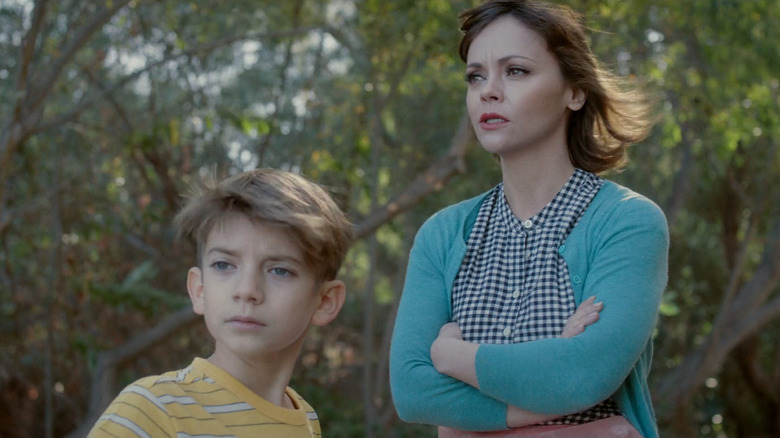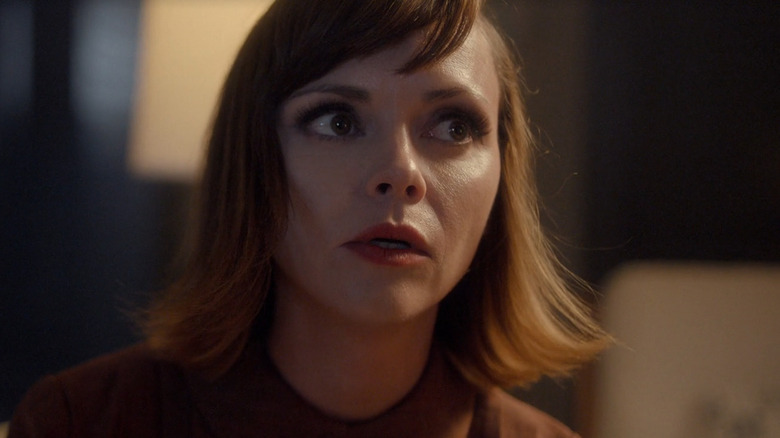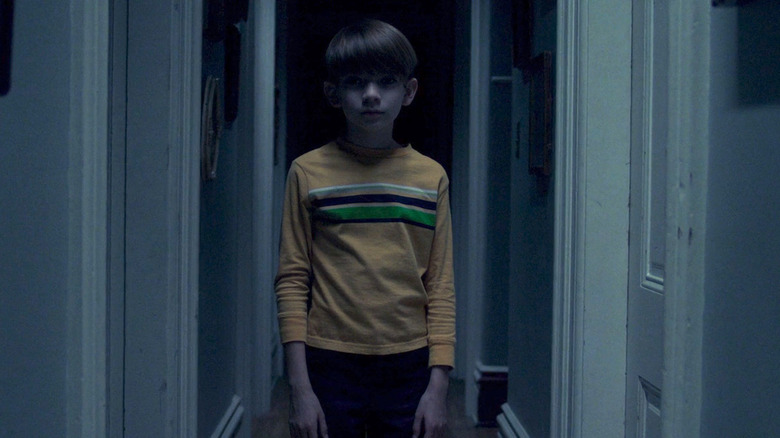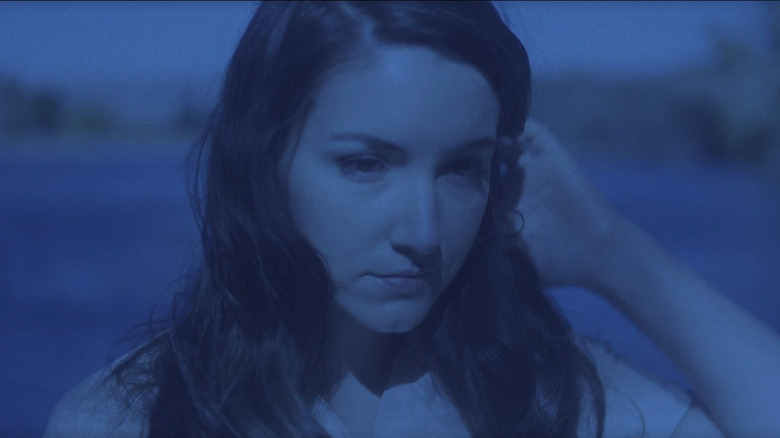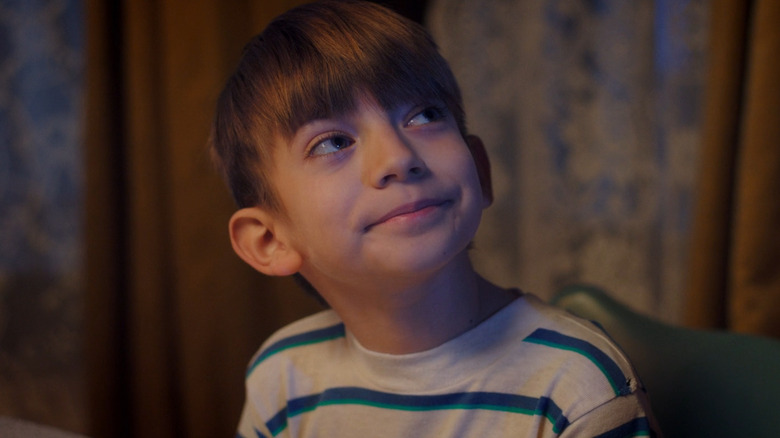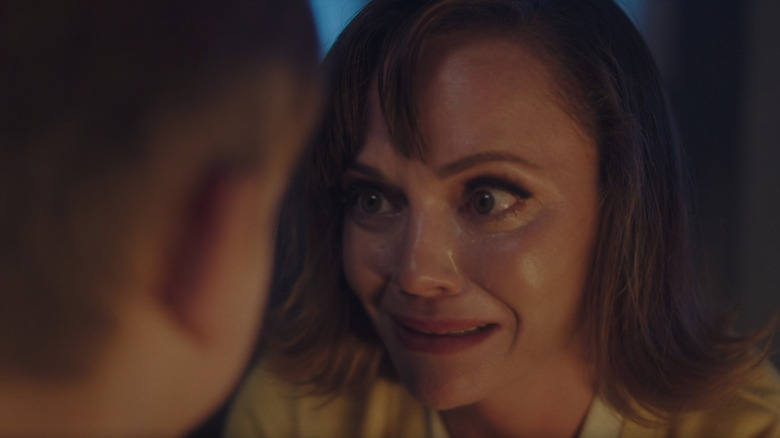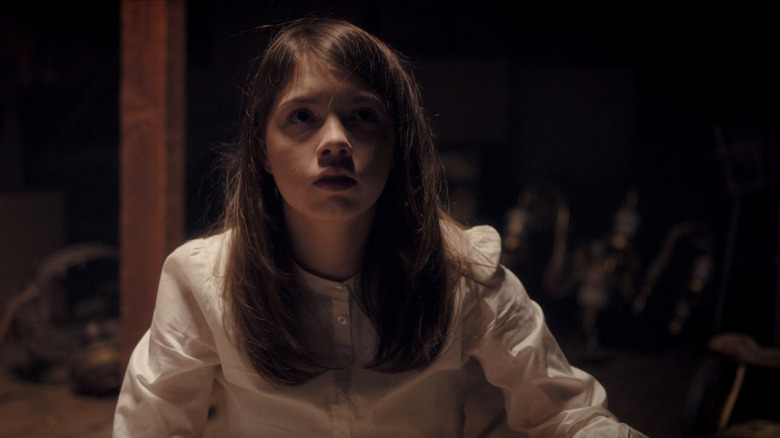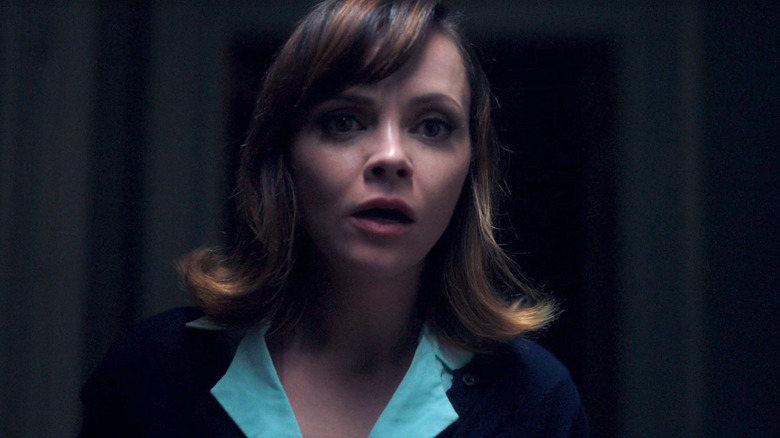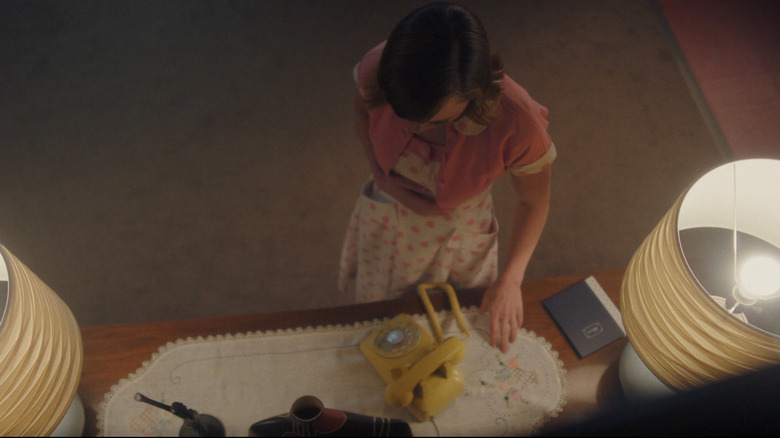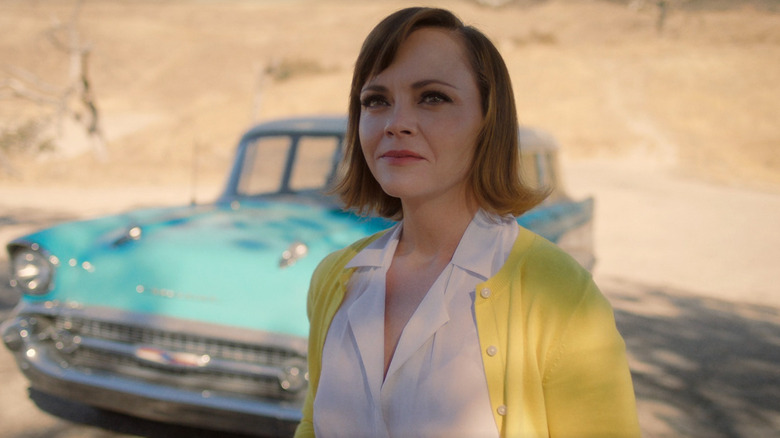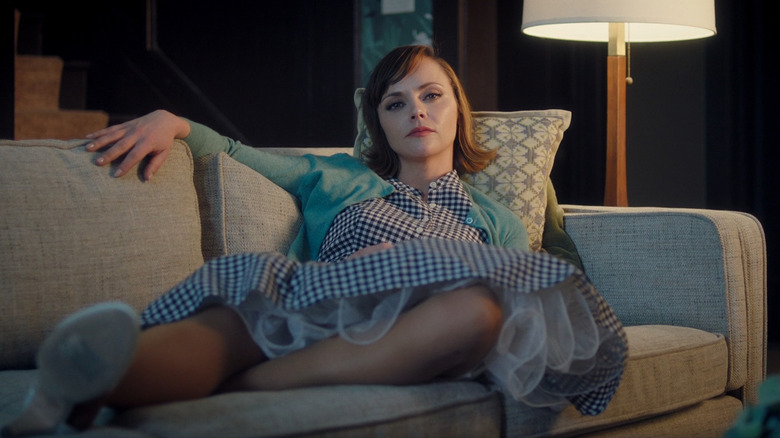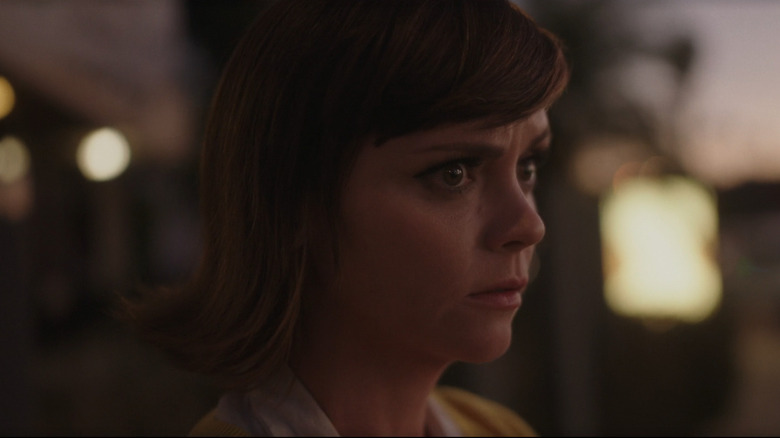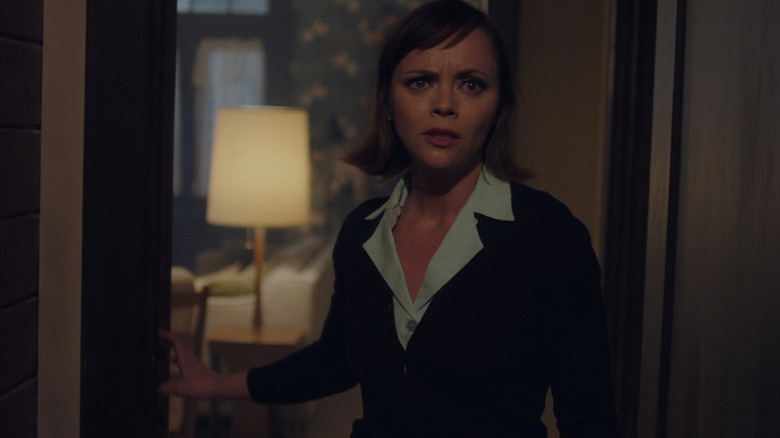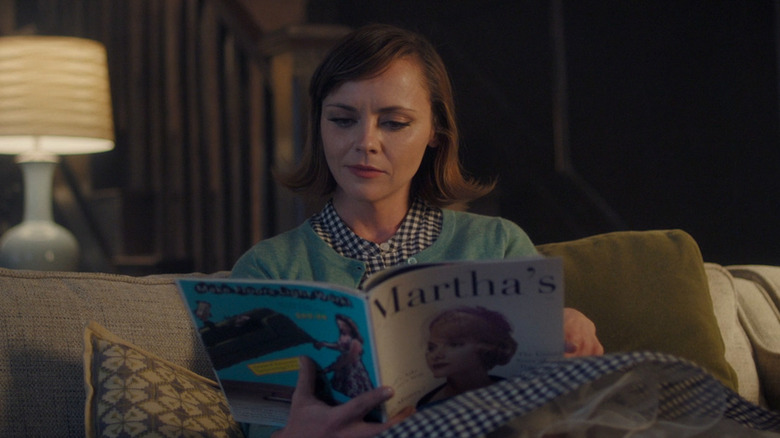The Ending Of Monstrous Explained
A film that flew under many people's radar when it was released in 2022, "Monstrous" stars Emmy-nominated actress Christina Ricci ("Wednesday") as Laura, a woman in the 1950s who escapes a bad marriage and rents a home in a new town. There, she and her son Cody (Santino Bernard) begin to be plagued by the presence of a horrific creature that lives in the lake behind their new house, and it seems to want just one thing: to kill little Cody.
As the story unfolds, there are new developments that turn the entire production on its head, only adding to the question of what the monster really is, and what it wants. An eerie film that will scare audiences in unpredictable and unlikely ways, "Monstrous" keeps viewers on the edge of their seat, wondering what is around every corner. But it will also make them think, because it's full of allegory and deeper meaning that may not be so easy to notice on first watch. With a number of shocking twists and surprising reveals, the film begs for an in-depth analysis of its complex themes, even if the narrative is fairly straightforward.
What you need to know about the plot of Monstrous
Many fans will decry a horror movie that's rated PG-13, fearing it will be some kind of bloodless affair meant to appeal to timid pre-teens. But that's not the case with "Monstrous," which really isn't a monster movie, nor a traditional fright-fest. Instead, it's a more horror-slanted psychological thriller set in the 1950s.
There we meet Laura, a young mother to little Cody. Laura has just escaped her abusive husband and has rented a home from friendly Mr. Langtree (Don Durrell) and his wife (Colleen Camp) while getting a job as a typist. As soon as they get settled, though, Laura and her son begin to experience odd occurrences at the house that Mr. Langtree can't explain. Laura has bizarre hallucinations, while Cody becomes convinced that there's a monster living in the lake that he can see from his window. When the monster gets inside and seemingly attacks Cody, Laura doesn't believe him, thinking it's just the terror of having escaped an abusive home.
Meanwhile, Cody is having trouble at school, with other children unwilling to accept him and reacting oddly to his presence. But just as Laura feels like things might be calming down, the monster appears to her as well, and she thinks the house might be haunted. With nowhere to go and a dangerous husband back home who seems determined to find her, she's left with few choices.
What happened at the end of Monstrous
For most of the film, Laura doesn't believe her son Cody when he claims there's a monster by the lake who is out to get him. She's sure it's just nightmares, but finally has a confrontation herself with the monster, which appears as a decaying corpse with long hair and floating tentacles that attempt to grasp her. With nowhere else to go and no one who believes her story, she stays in the house, sending Cody off to school nearby each day.
But things take a turn when Cody doesn't show up at the end of the school day, and none of the other children seem to know anything about him. Approached by a local cop, Laura is frantic about her missing son and is taken down to the police station to get to the bottom of things. Rather than be assigned an investigating officer, though, she is given a social worker, who wants to know about Cody's "accident" the year before.
As Laura describes it, Cody had fallen into a pool when her husband was watching him, but she insists that when she returned home she rushed in, rescued him, and all was well. In a stunning twist, just as 1950s Laura is telling the story, her cell phone buzzes. Because it's not the 1950s at all: It's 2022, and Cody died in that drowning accident a year earlier. Everything we've seen has been some kind of hallucination.
What was the monster by the lake?
The monster in "Monstrous" is an unusual creature. It first appears as a vague, nearly formless apparition in Cody's room. We're not sure what it is or what it wants, but soon enough it seems to show its sinister intent. Cody is understandably terrified of the creature, hiding from it and screaming for help when it appears, and in one of the film's most visceral moments, it attempts to envelop him while he's covered under his blankets. But what exactly is this monster, and what does it really want?
Well, early in the film we learn that Laura had once been extremely close with her grandmother, which is revealed in a flashback to her childhood. We also learn that in the present her grandmother had long since passed away, and in the film's final moments, we discover that the monster and her grandmother are one and the same — at least within Laura's perspective of events.
After we learn that Cody isn't quite real — and has been dead for some time — we discover that his great-grandmother has been trying to help bring Cody from the land of the living into the afterlife. The lake represents the world beyond, and once Laura realizes that Cody is really gone, she takes him down to meet the creature at the shore. There, it transforms into her own grandmother, who takes Cody beneath the water, allowing Laura's vision of him to metaphorically move on.
What really happened to Cody?
When we first meet Cody, we are led to believe he's like any other kid in the 1950s. He's bright, inquisitive, and precocious. By the ending of "Monstrous," though, we realize he was never really there. The truth is, Cody had died in a drowning accident, and there were clues throughout the film that could have tipped off the most astute audiences, including Laura's visions of being pulled underwater, and of course the opening sequence that sees Cody looking down into a crystal clear pool.
Over the course of the story, we're given further hints that something is amiss with Cody himself: At school, none of the other children seem to pay much attention to him, and nobody shows up to his birthday party. We're led to believe at first that this is because Cody himself never gave out any of the invitations, something that makes his mother quite angry. But the reality is that he never existed, so his mother made the invitations for a child that was never there — so he couldn't have handed them out at all.
Was he a manifestation of her subconscious, a way for her shattered psyche to make sense of the tragedy she'd suffered? Well, that's definitely open to some interpretation.
What the ending of Monstrous means
Though "Monstrous" initially seems like a typical haunted house story about a young woman and her son terrorized by a malevolent spirit, the truth is that it's something entirely different. An allegory for trauma, guilt, and grief, "Monstrous" is really about how far one's mind can go to avoid dealing with tremendous pain. In the case of Laura, she's constructed an entirely false reality — a world set in the 1950s — in which she's the victim of an abusive husband, escaping an awful life with her innocent child in a desperate bid to keep him safe from harm.
The ending of "Monstrous" shows us that there is nothing more important to Laura than her son, and that when he died, she felt a tremendous weight of guilt over his death. She wasn't there when he needed him the most, even if it wasn't her fault. In Laura's false world, it was her husband Scott who was the villain in her life — when in reality he was simply a father who lost sight of his son at a critical moment.
Unable to cope with the reality that she'd lost her son, Laura's mind manifested Cody to her, and she ran off to keep him safe with her forever. But as the walls of her idyllic fantasy world begin to break down, she's forced to accept the truth and snap back to reality.
Why did Laura live in the 1950s?
It's easy to understand why Laura would create a fabricated world where Cody was still alive and they were on the run from her abusive husband. This scenario paints her as a savior to her son, who she was able to protect from harm. But why did her mind put her in a 1950s setting? It all comes back to the brief flashback we're given to Laura's childhood that established her close relationship with her grandmother.
When she was just a little girl, Laura suffered heartbreak and retreated to the attic, hiding under a blanket — just as Cody did when the monster was stalking him. When her grandmother finds Laura, she sympathizes with the little girl, telling her how awful it must be to grow up in this time — and that things were simpler when she was younger. So when Cody dies, her grandmother's words must have been recalled, because Laura's subconscious created a reality set during an earlier decade, one that she must have perceived as being easier to cope in.
What's the meaning behind Laura's visions?
From the moment that Laura steps foot into her new rented house, she begins experiencing visions that haunt and disturb her. Sometimes they're as simple as seeing old, dusty, worn-out magazines on a coffee table, other times they're of a broken television, a fallen ceiling fan, or a torn couch. Under the dresser in her bedroom, she finds an earring covered in old fabric, which seems awfully out of place in this picturesque, pristine home.
These visions may seem strange, but they aren't visions at all: They are the world as it really is, because the house that she has rented from the Langtrees is actually an old, run-down, damaged house in a serious state of disrepair. At the end of the film, we see the true nature of the house, and it's a complete disaster, with broken pipes and rotting wood. Likewise, the beautiful 1950s car she drives is actually an old, rusted-out, barely functioning heap.
There are hints of this reality during the film, most noticeably in a statement made by Mrs. Langtree. When Laura complains of a leaky faucet, the cantankerous old woman snaps back that she "knew what she was getting" when she first rented the place, because from her perspective it must have seemed odd that Laura would want to rent such an old, run-down home, only to complain about a dripping sink.
Was anything real?
Laura's reality as a single mother in the 1950s was an elaborate world where everything was period-specific. She has a job as a typist, sends her son to an old-fashioned school, and drives a 1950s Chevy. But what was real and what wasn't? From what we can unravel, the only thing that wasn't real was Cody, while everything else we saw was merely a 1950s overlay of the real world. So when Laura got a phone call on her 1950s landline, for example, she was really talking on her cell phone.
Those calls from her supposedly abusive husband? That was really Scott, desperate to know where his wife had gone after their son died. Listen closely, and when he talks about his son he doesn't actually suggest that Cody is still alive, only saying that he misses him. So when Scott, the doctor, and even her own mother want to know where she is, it's not the sinister ploy we're led to believe — it's Laura's friends and family desperate to bring her back home to face the truth.
What about the car Laura was driving?
If everything in Laura's false life was a 1950s version of reality, does that mean that instead of a shiny new 1950s Chevy Bel-Air, she was really driving a 2022 Chevy Malibu? Not quite. Because this is one instance where what we saw really was there — though it did receive something of a facelift in her 1950s dream world.
As revealed at the end of "Monstrous," the car she was driving belonged to her grandmother. We see it in an old photograph, which on the back is written "Grandma's new car" and dated 1959. In her effort to build a world from her grandmother's youth, she drove the old, rusted-out car that still belonged to her, she just saw it as shiny and new. In fact, at the end of the film, we see its true form, and when she's driving back to Arizona, she even needs it repaired by a kind passerby.
In the final shot of the film, Laura is seen reverting to her real self — wearing 2022 clothing — and driving the run-down version of her grandmother's Chevy. This suggests that Laura has indeed broken free of her grief and accepted her son's death, ready to embrace an uncertain future.
Alternative theories about the end of Monstrous
The ending of "Monstrous" reveals that Cody has died, and the boy we've seen throughout the film is actually all in Laura's head. But what if there's another interpretation? Although the film is clearly about dealing with guilt and grief, and Laura's inability to move on from the death of her son, it also shows Cody's perspective on several occasions, including attacks by the monster when Laura is never present.
In another possible explanation, it's plausible that Cody was real, but only visible to Laura. It could very well be that what we see in the film is Cody's real spirit or soul trapped in limbo because of his mother's love, and unable to move on until she could finally accept his death. This interpretation would give "Monstrous" more of a spiritual theme, with the lake more literally representing heaven, and the monster — Laura's grandmother's soul — arriving to ferry Cody into God's loving embrace.
What fans and critics had to say about the ending of Monstrous
Over on review aggregator Rotten Tomatoes, "Monstrous" was met with mixed reviews from critics, who left it sitting at an unspectacular 56%. Some, like CBR's Jon Mendelsohn, felt that the film's darker themes were strong, but were let down by the film's obsession with its big twist ending that threatened to "derail the movie," though he ultimately gave it a positive overall review. Michael Gingold of Rue Morgue Magazine felt the opposite, though, claiming that "lapses in narrative logic might have gone down easier with an ending that was better thought out to tie all the dangling story threads together."
Nevertheless, "Monstrous" was received well by audiences, who gave the film much better reviews. One fan commented that what was an otherwise ordinary and overused idea was made better by its twist conclusion, saying "it pulls an ending out of thin air" that elevates the entire affair. Most fans agreed, praising its gripping suspense and multiple surprising reveals that kept the story from falling into too-familiar territory.
What has Christina Ricci said about the ending of Monstrous?
Fans and critics have had a lot to say about the ending of "Monstrous" — both good and bad — as well as their own interpretations. Christina Ricci, who played Laura, also has her own take on the ending, as she told Awards Radar in 2020. Speaking about her character, she felt that Laura's constructed reality in the 1950s didn't mean she was weak at all. "I like that one of her strengths is so strong that it's tricking her," she explained. "Her mind is protecting her from pain in such a way that she believes it's another reality — that's a strength."
Ricci also feels that Laura's mental anguish and the life she built for herself to cope with it aren't unique to Laura, and is something we all do at times. "I sometimes think in life that when we're afraid, we believe in irrational things, and that sometimes comes from anxiety — it can be the manifestation of emotional trauma." Additionally, she felt that turning the story of despair and loss into something of a horror movie was a refreshing idea. "I like that the movie is about all of this horror [being] her inability to let go and grieve."
What has the director said about the ending of Monstrous?
Speaking to Howard's Haunt, "Monstrous" director Chris Sivertson revealed how the ending was kept hidden from audiences in an attempt to surprise in a way that's rare for films these days. It's why the movie's title was chosen, to give the impression that the focus would be on a more literal monster, which winds up appearing in very little of the film at all. "The trailer I think does a good job of kind of selling the horror movie aspect of it," he said. And that was important, even if it did mean that reactions would be skewed for viewers with different expectations.
In the end, though, any expectations of the film being more of a monster movie weren't Sivertson's concern, because for him the ending was what it was really all about. "It builds to a very strong emotional point, to where when I read it in the script I was like, 'wow this is a really good challenge.'" It was that element of the story that piqued his interest in joining the project, which already had Christina Ricci attached. "It's always interesting to me to take a really big swing." And there are no bigger swings than revealing to your audience that the entire story they've been watching has all been in the lead character's head.
